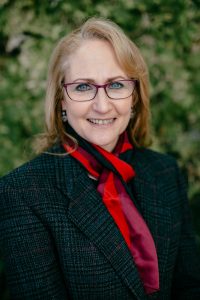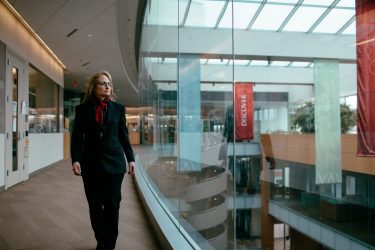For the past six years, the Wisconsin Institute for Discovery has been assembling a world-class cross-disciplinary faculty, developing innovative research programs, and establishing itself as a research hub on the University of Wisconsin–Madison campus. As of February 1, 2017, WID is entering a new phase under the leadership of Professor Jo Handelsman.
Handelsman received her Ph.D. in molecular biology and held professorships in the Plant Pathology and Bacteriology Departments at UW-Madison before spending several years at Yale University and as the associate director for science in the White House Office of Science and Technology Policy. She returns to UW-Madison just as WID prepares to take the next step in its development as an institute built to lead 21st-century approaches to science.
For Handelsman, that means analyzing what WID has accomplished so far and thinking carefully about where WID should go next. “The product of the last five years is in the people, and it’s fantastic,” she says. “WID is not a blank slate any more. There are certainly a lot of formulated ideas and plans, there are a lot of opportunities for new directions, new approaches, and building a better and more unique WID.
“There are a lot of opportunities for new directions, new approaches, and building a better and more unique WID.”
“It’s time for the faculty, students, staff, and entire WID community to think about what WID needs to be, wants to be, and what makes WID absolutely unique on campus. The answer must be something about the way that we interact – not only the way we interact with each other within WID, but how WID interacts with the Morgridge Institute for Research, with the rest of campus, and with the State of Wisconsin. I think we need to look at those in that sequence; we need to first analyze what we want WID to be within ourselves and then figure out how to build the synergies with the Morgridge Institute, the campus, and the State.
“From talking to members of the WID community, there is a general agreement that more interaction and more collaboration across themes and across disciplines is part and parcel to the future of WID.”

One mechanism Handelsman envisions implementing to encourage more interaction and inter-disciplinarity at WID is the model of grand challenges – “audacious but feasible goals on a national or global scale that capture the imagination and demand advances in innovation and breakthroughs in science and technology.” The concept was introduced by the White House in 2012 and has been very successful on campuses across the country. Handelsman says she is very interested in “finding major societal, environmental, and intellectual problems that can be solved by a very broad community of people, bringing together people who would never have thought they would have anything in common around common problems.”
Grand challenges are one avenue by which Handelsman believes WID can address a fundamental obstacle to successful collaborative research: finding the right people to solve big problems. “The classical way that scientists collaborate is to say, ‘we need to solve a problem and we need a certain kind of scientist or engineer to do it,’ and then they approach that kind of person. We don’t avail ourselves of all the talent that we could because we don’t engage as broadly as we could. I believe that moving to a system where people self-select into a problem rather than being selected by the oligarchy that is leading the analysis of that problem is a way that you end up with ideas that you don’t anticipate.”
This approach is one of many ways Handelsman says her experiences at the White House, where implementing new ideas required close collaboration with surprising numbers and varieties of interested parties, will help her move WID forward. “One of most effective things I learned in the White House that is completely transferable [to WID] is that using the larger community – and I mean the much larger community – is one of the most powerful tools we have to solve problems… Invariably, ideas would emerge that we had never thought of and there were parties that we never would have imagined being engaged or interested.”
“WID is an intellectual, scientific, and technical force and the kind of power that we need to solve the big, knotty problems of the future.”
Handelsman also hopes to engage the public in determining WID’s progress and mission: “WID is an intellectual, scientific, and technical force and the kind of power that we need to solve the big, knotty problems of the future. That may sound abstract, but what I hope to contribute to is engaging a broad audience in Wisconsin in defining and solving problems, which in turn will help the citizens of the State understand, by actually participating in it, why science is such a powerful force for good and for improving people’s lives.”
In addition to leadership and new initiatives, Handelsman brings with her a robust and productive research program centered around microbial communities and chemical signaling. “We’re interested in the genetics and chemistry of what makes a microbial community a robust and stable system… what makes them functional as communities, as units, and in particular, what makes a community invasible or not – what makes it resistant to alien members. I guess that topic has particularly political overtones right now, but it’s also a fundamental biological question.”
Bringing her research and expertise to WID provides great opportunities for Handelsman and WID faculty to drive cross-disciplinary collaborations and advance the mission of WID. Handelsman’s own work is an especially good fit with WID’s existing Systems Biology theme. “One of the things that I’ve tried to do for a long time – and the technology, the math, the genetics is finally there – is to look at a community as a whole system, and so that’s why I’m very excited about working with people at WID who have the quantitative tools to analyze groups of bacteria as a system rather than as just individuals. This is the ideal time for me to have collaborators here.”
Finally, Handelsman is excited to return to the UW-Madison campus and immerse herself in the innovative environment at its heart. “It is an honor to be embedded in the tremendous intellectual capacity in the Discovery Building. The UW campus is an incredible partner for anything that WID does. The traditions of Wisconsin are really great to be coming back to – the intellectual and social traditions here are different from any place I have seen. It’s great to be part of the Wisconsin way of doing things again because I think it will shape a WID that is a uniquely potent force for innovation because it is born out of the values and the traditions of the Wisconsin community.”
— Interview by Nolan Lendved


You must be logged in to post a comment.